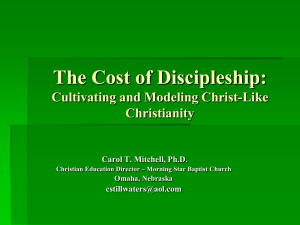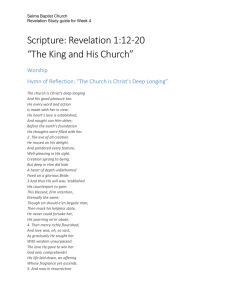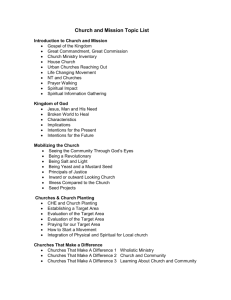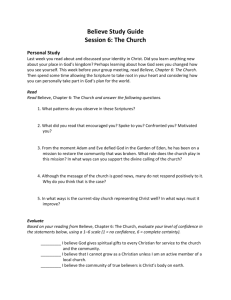Revolution - Immanuel Baptist Church
advertisement
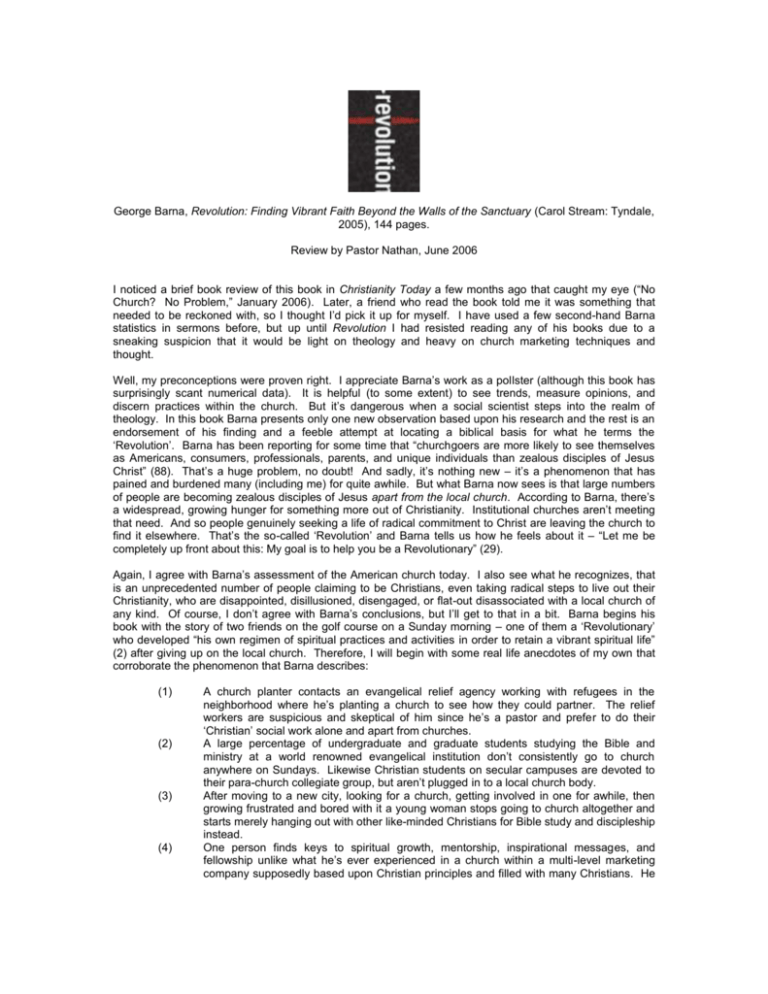
George Barna, Revolution: Finding Vibrant Faith Beyond the Walls of the Sanctuary (Carol Stream: Tyndale, 2005), 144 pages. Review by Pastor Nathan, June 2006 I noticed a brief book review of this book in Christianity Today a few months ago that caught my eye (“No Church? No Problem,” January 2006). Later, a friend who read the book told me it was something that needed to be reckoned with, so I thought I’d pick it up for myself. I have used a few second-hand Barna statistics in sermons before, but up until Revolution I had resisted reading any of his books due to a sneaking suspicion that it would be light on theology and heavy on church marketing techniques and thought. Well, my preconceptions were proven right. I appreciate Barna’s work as a pollster (although this book has surprisingly scant numerical data). It is helpful (to some extent) to see trends, measure opinions, and discern practices within the church. But it’s dangerous when a social scientist steps into the realm of theology. In this book Barna presents only one new observation based upon his research and the rest is an endorsement of his finding and a feeble attempt at locating a biblical basis for what he terms the ‘Revolution’. Barna has been reporting for some time that “churchgoers are more likely to see themselves as Americans, consumers, professionals, parents, and unique individuals than zealous disciples of Jesus Christ” (88). That’s a huge problem, no doubt! And sadly, it’s nothing new – it’s a phenomenon that has pained and burdened many (including me) for quite awhile. But what Barna now sees is that large numbers of people are becoming zealous disciples of Jesus apart from the local church. According to Barna, there’s a widespread, growing hunger for something more out of Christianity. Institutional churches aren’t meeting that need. And so people genuinely seeking a life of radical commitment to Christ are leaving the church to find it elsewhere. That’s the so-called ‘Revolution’ and Barna tells us how he feels about it – “Let me be completely up front about this: My goal is to help you be a Revolutionary” (29). Again, I agree with Barna’s assessment of the American church today. I also see what he recognizes, that is an unprecedented number of people claiming to be Christians, even taking radical steps to live out their Christianity, who are disappointed, disillusioned, disengaged, or flat-out disassociated with a local church of any kind. Of course, I don’t agree with Barna’s conclusions, but I’ll get to that in a bit. Barna begins his book with the story of two friends on the golf course on a Sunday morning – one of them a ‘Revolutionary’ who developed “his own regimen of spiritual practices and activities in order to retain a vibrant spiritual life” (2) after giving up on the local church. Therefore, I will begin with some real life anecdotes of my own that corroborate the phenomenon that Barna describes: (1) (2) (3) (4) A church planter contacts an evangelical relief agency working with refugees in the neighborhood where he’s planting a church to see how they could partner. The relief workers are suspicious and skeptical of him since he’s a pastor and prefer to do their ‘Christian’ social work alone and apart from churches. A large percentage of undergraduate and graduate students studying the Bible and ministry at a world renowned evangelical institution don’t consistently go to church anywhere on Sundays. Likewise Christian students on secular campuses are devoted to their para-church collegiate group, but aren’t plugged in to a local church body. After moving to a new city, looking for a church, getting involved in one for awhile, then growing frustrated and bored with it a young woman stops going to church altogether and starts merely hanging out with other like-minded Christians for Bible study and discipleship instead. One person finds keys to spiritual growth, mentorship, inspirational messages, and fellowship unlike what he’s ever experienced in a church within a multi-level marketing company supposedly based upon Christian principles and filled with many Christians. He (5) hops around from church to church to find one that won’t interfere with his business/church surrogate. A large family objects that none of the churches in their town are spiritually alive and so they have ‘homechurch’ (something akin to ‘homeschool’) every Sunday and throughout the week. It’s everywhere. And it’s growing. In part, it is the natural outcome of twentieth century evangelical entrepreneurialism that gave us independent missions agencies like Frontiers; collegiate ministries like Campus Crusade; independent Bible colleges like Moody; and a whole host of other ecclesiastically unassociated organizations like Bible Study Fellowships, Youth for Christ, Athletes in Action, Youth With A Mission, Focus on the Family, Promise Keepers, and many, many more. The ‘low ecclesiology’ of evangelicalism that birthed the para-church movement is turning into the ‘no ecclesiology’ of the so-called ‘Revolution’. According to Barna, “millions of [‘Revolutionaries’] who are growing as Christians and passionate about their faith have come to recognize that the local church is not – and need not be – the epicenter of their spiritual adventure” (58); “Being part of a local church may facilitate [loving God with all your heart, mind, strength, and soul]. Or it might not” (37). In other words, according to Barna, the local church is unnecessary, and in many instances even a detriment to following Christ. I beg to differ. The spiritual state of churches today may indeed be tragic. They may indeed be failing to adequately make disciples of Jesus Christ. They may indeed be more interested in man-made traditions and institutional survival rather than helping people meet and better know God. But there is no warrant for declaring the institutional church unnecessary. Jesus’ words to Peter – “on this rock I will build my church, and the gates of Hades will not overcome it” (Mt. 16:18) – began to be fulfilled in the book of Acts with the establishment of the church in Jerusalem and its spread to other parts of the empire, which the NT epistles give evidence to. That church – imperfect, flawed, and plagued with periods of apostasy – has not failed to prevail and spread for two millennia. It has taken different forms in different times and cultures (i.e. informal house churches, ornate cathedrals complete with set liturgies and elaborate hierarchical structures, underground churches, megachurches, independent Bible Churches), but the divinely ordained institution of the church has remained as the rightful heir and protector of biblical Christianity. Faithful Christians will remain committed to the church despite its shortfalls and seek its reformation and revival, not abandon it. As I see it, there are 5 major reasons why the local church is not unnecessary, but indispensable. (1) Christianity is communal. Barna cites “spiritual friendships” as one of the seven passions of a ‘Revolutionary’, but yet still operates under a radically individualistic framework. He says, “The choice to become a Revolutionary… is a covenant you make with God alone. The commands and admonitions provided by Jesus to all who would listen were designed to facilitate self-governance that makes each disciple a revolution in progress” (70, italics mine). Later he says, “Each Revolutionary consents to be personally responsible for his or her spiritual state – whether that’s growth or stagnation” (104, italics mine). Finally, he describes the ‘Revolutionary’ as “weaving together a set of favored alternatives into a unique tapestry that constitutes the personal ‘church’ of the individual” (66). Personal church of the individual?!?! Pronouncing the church as unnecessary, even if you glibly claim to replace it with more authentic ‘spiritual friendships’, is a prime example of maverick Christianity and the epitome of American individualism run amok. You have decided that you alone are the arbiter of truth, despite the witness of tradition and other brothers and sisters in Christ. And community apart from formal commitment rings hollow. What is there to keep you together with people who step on your toes or are different from you if you are not both committed to each other in some formal way? Similarly, private spirituality is crucial, but not at the expense of communal spirituality. We need to pray alone, but we also need to pray together. We need to worship alone, but there is something powerful and profound to worshipping with others, particularly others that you know and are committed to you. This is something that can’t happen at a Chris Tomlin, David Crowder, Matt Redman, or Tim Hughes concert that’s put on “for audiences who had no prior connection to each other” (65-66). Christianity is communal in a way that can only happen in some manifestation of a local church where people are officially committed to each other and, in some sense, responsible for each other’s spiritual state. We need each other. (2) Christian community requires leadership and submission. Another aspect of today’s radical individualism is our stubborn lack of willingness to submit to authority. Ultimately the Bible is our authority. But the Bible also makes clear that in the communities that were established as the gospel spread, spiritual leadership was vested in a group called the elders/overseers/pastors (e.g. Acts 14:23). Pastoral authority is a must in the spiritual life. Sure it’s been abused and sure some pastors are wolves in sheep’s clothing, but the biblical precedent of elders is undeniable. People need to be taught. Elders are men who are specially gifted (and many times specially trained) to teach. People need guidance, care, and protection. That’s why God ordained that there be elder leadership in churches. Sheep without a shepherd is a pitiable affair. We need to be shepherded, and merely listening to sermons on the internet doesn’t count. (3) Christian community requires accountability. Being in community and under authority implies accountability. When you formally bind yourself to others you open your life up to them and give them permission to help you in your spiritual walk. If you get out of line, you need people who can point that out to you – oftentimes gently, but sometimes with tough love. The kind of situation that Paul describes in 1 Corinthians 5 could not happen if the Corinthians were not a local church. Church discipline is biblical and church discipline necessarily implies church membership, therefore church is biblical. Those untied to a particular group of other believers through a formal membership commitment and subsequently free from any kind of shepherding authority will ultimately suffer spiritually. We need accountability and communal discipline which is impossible if you’re a ‘Revolutionary’. Community, authority, and accountability are very hard to swallow in our culture today, but it is exactly what the Bible prescribes as necessary for authentic Christian living. (4) Christians need to participate in the sacraments. The Bible lays out two enduring ordinances that are essential for spiritual growth – baptism and the Lord’s Table/Eucharist. Traditionally baptism has been tied with church membership and understood as a public proclamation, but there’s nothing in the Bible that precludes this from being a private (with at least one other person, of course) event outside the walls of a church. Communion, on the other hand, is in its very nature a communal act. It is something you do together to remember the Lord’s sacrifice and experience his grace. It’s more than just having a meal together. It’s a symbolic ritual and it usually doesn’t happen at a Christian businessmen’s luncheon or in an InterVarsity meeting. The Eucharist is also something very physical. It can’t happen in a cyberspace chat room. The ordinances are required Christian practices and they take place within the church. If you have a committed Christian community that is submitted to the authority of elders, participates in the ordinances together, and is willing to practice discipline, then you have a church – no matter whether or not there is a building, organ, children’s program, bulletin, pulpit or not. If you have those things you are a church. If you have most of them, but don’t have some of them, why not incorporate the elements you lack and be a fully biblical church? If there are no churches with vitality in you neighborhood, get together some friends and plant one. If you find your church to be stagnant and missing the point, pray for it, talk to the pastors, and throw yourself into serving it. Whatever you do, please don’t pretend to have found spiritual vitality by being liberated from the local church. Being a part of a church certainly doesn’t guarantee spiritual life, but disregarding the church is a sure-fire way to bring about spiritual death. I find Barna’s endorsement of the aberrant practice of forsaking the local church to be appalling. Ultimately, I can’t get around the biblical teaching that the church, complete with members and pastors and discipline and sacraments, is the mystical Body of Christ! This is the fifth reason why the local church is indispensable. The church is not something “we made… up” (38)! It is sacrosanct because it is in some mysterious way the Body of Christ. To be connected to a group of other believers each exercising his or her own spiritual gifts interdependently is to be intimately connected to Christ. Immanuel Baptist Church is the very body of Christ in a way that “the personal ‘church’ of the individual” is not. When Jesus appeared to Saul on the Damascus road he equated Saul’s persecution of the church with persecuting himself. I fear that despite Barna’s good intentions, he is persecuting Jesus himself by attacking his body, the church. Nevertheless, I have no fear that the church will endure even through this ‘Revolution’.

